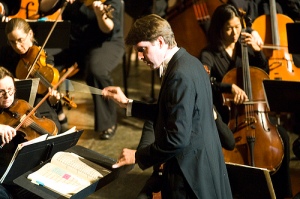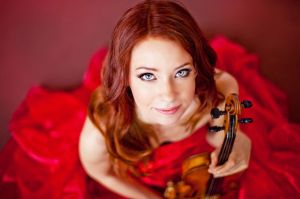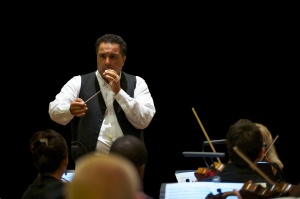The festival’s new music director looks forward to the music and the mountains
By Peter Alexander

Kenneth Woods. Photo by Benjamin Ealovega.
I spoke to Kenneth Woods, the incoming music director of Colorado MahlerFest, by phone recently. We talked about his vision and plans for the future of the festival, as well as a few personal details that will help introduce Woods to the Boulder audience. (For more on Woods, I highly recommend his blog, A View from the Podium.) Here is a lightly edited and condensed transcript of our conversation:
PA: You are clearly well aware of MahlerFest. Have you attended a performance before, or do you know of the festival by reputation? Have you met Robert Olson?
KW: I’ve never been able to attend a MahlerFest in the past, and I’ve never met Bob (Olson) in person. The degrees of separation between me and Bob, and me and the festival, are very few. I think I first became aware of it through an email listserv called Mahler List, which a lot of Mahler conductors and scholars and aficionados are on. And Colorado MahlerFest has always been a great gathering point for people on that list.
I can remember joining in back in the late ‘90s or early 2000s and everyone would be gearing up for Colorado MahlerFest, talking about what papers were presented, and what repertoire was played. So I became very aware of it then, and the sort of footprint of people who’d come through as speakers and lecturers is pretty astounding. There’s a lot of really interesting debate about key aspects of Mahler scholarship and performance that has come out of people who have spoken there, and the papers presented there, so there has been a lot of real great interest on the musicological side of the festival over the years. It’s a very small world, and particularly so when you get into Mahler. So I’m very excited to be stepping into that.

Gustav Mahler. Photo by Moritz Näher.
Mahler seems to attract a kind of devotion that other composers don’t—such as people traveling halfway around the world to go to a festival in Boulder. Why do you think that is?
I think part of it comes out of the historical way in which Mahler came into the repertoire. Even when I was growing up in the ‘70s and ‘80s the music was more written about than heard and performed. A performance of it was a rarity—back then you could come across the First and Fourth symphonies sometimes. But a piece like the Sixth or the Seventh or the Ninth was a real rarity.
My understanding is that one of the reasons Bob set up the festival, and one of the things that helped get it going initially, is that the music was not very often performed. For people who love it, there weren’t that many chances to perform it. That’s really changed in the past 15 years. It used to be considered something that only orchestras with the largest base of players and the biggest budgets would ever dare tackle. Of course, nowadays all sorts of youth orchestras and community orchestras play it. But I think for people who grew up in that age, that sense of advocacy and immersion and curiosity sticks with us.
For me working through the symphonies as a listener as a young musician, you had to order the record and wait for it to show up. You had to go looking for it. And the idea that you can go on YouTube now and instantaneously access dozens and dozens of Mahler performances these days—it’s a totally different world! And in that sense, I think MahlerFest means something very different that it probably did 28 years ago. That sense of discovery and immersion is really important. And to have a place that is all about Mahler, where you come and really focus on it for a week, I think is a really important thing for this music.

Kenneth Woods. Photo by Stephanie Yao/The Oregonian.
Do you think the fact that Mahler performances are much more common now than 28 years ago presents a challenge to the festival going forward?
The music is always going to be special and exciting and have great appeal to audiences. Staking out our territory as a place that really owns Mahler, that cares about Mahler—that’s not something that every conductor and every orchestra is well suited to. So it’s good to have a place where we can get back to first principles of Mahler, and really immerse ourselves in it. In terms of contextualizing the music, we’ve only sort of scratched the surface there, so I’m not worried about running out of things to do, anytime in my lifetime at least.
It’s almost a reverse of the paradigm of 30 years ago. At one point MahlerFest was needed because there was nowhere else to go to play and hear the music. Now it’s needed because we need a place where the music isn’t taken for granted, or just a piece that’s good for box office. In that respect, the festival is a very important institution, and one that I think makes a strong claim to being essential to the music.
Do you have any thoughts about next year? Do you expect to continue cycling through the major works, or have you even had time to think about that?
I’ve been thinking about it a lot, and nothing is set or announced. The big question is whether we finish the cycle that Bob has been working on the past several years, which is not quite complete yet, or start over from scratch with the First Symphony next year. I’m somewhat inclined to finish with the two symphonies that he hasn’t done in this cycle, which is Seven and Ten, in the next two years, for a couple of reasons.
The festival has never done the Deryck Cooke version of the Tenth Symphony [which the composer never finished], which was the first and in many ways the most influential. I think that would be a wonderful thing to add to the repertoire of the festival—it’s such an important moment in Mahler scholarship. And I also like the idea of getting to know each other, finding out what possibilities and the strengths and weaknesses are before we start on the next cycle.

Mahler’s autograph score of Symphony No. 7.
It could very well be that we start with Seven next year, which is one of my favorites in the cycle and not that often done generally. And then the Tenth Symphony the following year, and then start a fresh cycle in the third year, from the First Symphony onwards.
You did not mention the Eighth Symphony, which has not been done as part of this cycle.
I was a little unclear about where that had fit in the last run of things. I would love to do the Eighth, and it might be that we would do that in the third year. That’s a particularly ambitious one logistically.
From what you’ve seen so far, what do you think is the greatest strength of this festival that you would want to build on?
I think there’s two. The combination of live concert giving with idea sharing is really potent and something that the festival does better than the vast majority. And I think it’s something that can really be built on.
And the other thing is the community spirit that seems to exist within the orchestra and within the festival itself that Bob has obviously nurtured very carefully in terms of this volunteer band with very high standards, high aspirations. People really doing it together as a team out of a sense of shared purpose is something to really build on.
Have you thought about expanding the repertoire to people who were important for Mahler, or were influenced by him, as ways of giving audiences new perspectives on Mahler the composer?

Mahler hiking in the Austrian alps.
Yes, absolutely. These things are already on discussion—whether it’s hearing, say, Mahler 1 with Beethoven 4 where there’s an obvious modeling at work between the two pieces, or pairing the Mahler 7 with the Schoenberg First Chamber Symphony, where there’s thematic borrowing between the two pieces.
It would be nice to get into some commissioning over the next two years. I was involved with a festival at Bridgewater Hall in Manchester a few years ago where they commissioned a new work to go with Mahler symphonies in a new cycle, and I thought that worked really, really well. Not all the pieces were masterpieces, but three of four of them were sensational. It was really interesting to hear Mahler in a context alongside music that was written to comment on it or reflect it in some way. It would be nice to see some of that kind of work at the MahlerFest. At the end of the day, commissioning is what becomes the legacy of any artistic institution.
I know you have spent time in Colorado before. Do you know Boulder at all?
I spent a couple of summers in Aspen back in my student days. And I did a chamber music festival way out in the opposite corner of the state, in Durango, maybe 2006 or ‘07?
I do know Boulder quite well. I’ve got a lot of friends that teach at Rocky Ridge up at Estes Park, so I know that part of the world quite well. I’ve done a lot of skiing in Colorado too, but that won’t be happening in May.
There are ski areas that are still open through May, up at the higher elevations.
True. I could come a week early and ski, then do Mahler. That sounds very alpine.
Two things that people in Boulder really care about, aside from music of course, are outdoor recreation and food. Do you have preferences in those areas?
The thing I miss most when I’m in Britain is American beer, so I’m always happy to come back. Fat Tire was always the official beer of Aspen when I was there in past years, so I’ll be happy to catch up with a nice cold Fat Tire once I get to Colorado.
My favorite Colorado food is the Mexican green chili that no other state in the USA does as well, so I’ll be looking forward to that, assuming I can still find it there.

Kenneth Woods. Photo by Chris Stock.
As far as the outdoor stuff, my parents got my sister and me started with backpacking in the Rocky Mountains when I was about 5 or 6. We spent half of my summers at least in Colorado hiking as a kid. I will very much be looking forward to getting up in the mountains and doing some hiking while I’m out there. And my summers in Aspen I did a lot of road biking. Once you’re in shape, there’s nothing more satisfying than biking up to something like Independence Pass and riding back down. I’ll be looking forward to bringing with or borrowing a bike while I’m there and getting on some hills. It will be humbling the first couple of times, but it’s so spectacular there.
 The Boulder Philharmonic is one of only four orchestras from across North America chosen to participate in a new festival at the Kennedy Center in Washington, D.C.
The Boulder Philharmonic is one of only four orchestras from across North America chosen to participate in a new festival at the Kennedy Center in Washington, D.C.




























 Erica Papillion-Posey, Carmen
Erica Papillion-Posey, Carmen